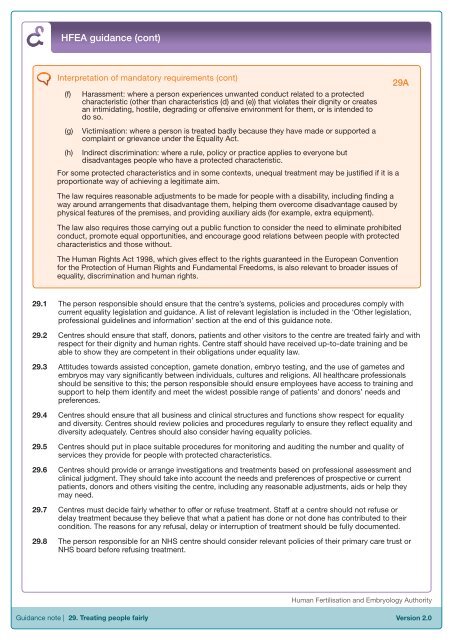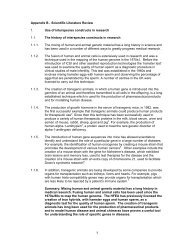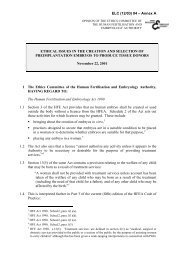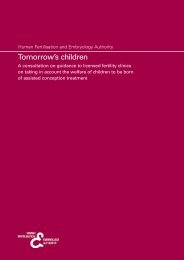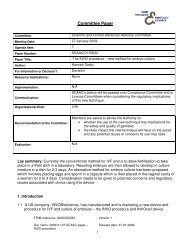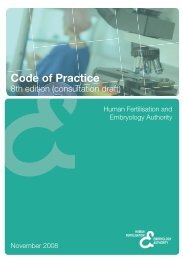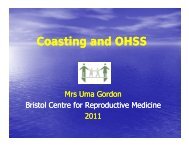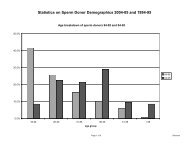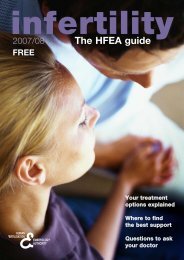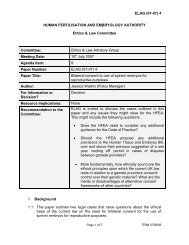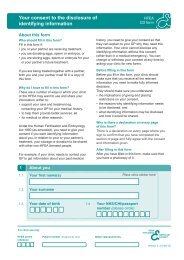Eighth Edition - R.3 - Human Fertilisation & Embryology Authority
Eighth Edition - R.3 - Human Fertilisation & Embryology Authority
Eighth Edition - R.3 - Human Fertilisation & Embryology Authority
You also want an ePaper? Increase the reach of your titles
YUMPU automatically turns print PDFs into web optimized ePapers that Google loves.
HFEA guidance (cont)<br />
Interpretation of mandatory requirements (cont)<br />
(f)<br />
(g)<br />
Harassment: where a person experiences unwanted conduct related to a protected<br />
characteristic (other than characteristics (d) and (e)) that violates their dignity or creates<br />
an intimidating, hostile, degrading or offensive environment for them, or is intended to<br />
do so.<br />
Victimisation: where a person is treated badly because they have made or supported a<br />
complaint or grievance under the Equality Act.<br />
(h) Indirect discrimination: where a rule, policy or practice applies to everyone but<br />
disadvantages people who have a protected characteristic.<br />
For some protected characteristics and in some contexts, unequal treatment may be justified if it is a<br />
proportionate way of achieving a legitimate aim.<br />
The law requires reasonable adjustments to be made for people with a disability, including finding a<br />
way around arrangements that disadvantage them, helping them overcome disadvantage caused by<br />
physical features of the premises, and providing auxiliary aids (for example, extra equipment).<br />
The law also requires those carrying out a public function to consider the need to eliminate prohibited<br />
conduct, promote equal opportunities, and encourage good relations between people with protected<br />
characteristics and those without.<br />
The <strong>Human</strong> Rights Act 1998, which gives effect to the rights guaranteed in the European Convention<br />
for the Protection of <strong>Human</strong> Rights and Fundamental Freedoms, is also relevant to broader issues of<br />
equality, discrimination and human rights.<br />
29A<br />
29.1 The person responsible should ensure that the centre’s systems, policies and procedures comply with<br />
current equality legislation and guidance. A list of relevant legislation is included in the ‘Other legislation,<br />
professional guidelines and information’ section at the end of this guidance note.<br />
29.2 Centres should ensure that staff, donors, patients and other visitors to the centre are treated fairly and with<br />
respect for their dignity and human rights. Centre staff should have received up-to-date training and be<br />
able to show they are competent in their obligations under equality law.<br />
29.3 Attitudes towards assisted conception, gamete donation, embryo testing, and the use of gametes and<br />
embryos may vary significantly between individuals, cultures and religions. All healthcare professionals<br />
should be sensitive to this; the person responsible should ensure employees have access to training and<br />
support to help them identify and meet the widest possible range of patients’ and donors’ needs and<br />
preferences.<br />
29.4 Centres should ensure that all business and clinical structures and functions show respect for equality<br />
and diversity. Centres should review policies and procedures regularly to ensure they reflect equality and<br />
diversity adequately. Centres should also consider having equality policies.<br />
29.5 Centres should put in place suitable procedures for monitoring and auditing the number and quality of<br />
services they provide for people with protected characteristics.<br />
29.6 Centres should provide or arrange investigations and treatments based on professional assessment and<br />
clinical judgment. They should take into account the needs and preferences of prospective or current<br />
patients, donors and others visiting the centre, including any reasonable adjustments, aids or help they<br />
may need.<br />
29.7 Centres must decide fairly whether to offer or refuse treatment. Staff at a centre should not refuse or<br />
delay treatment because they believe that what a patient has done or not done has contributed to their<br />
condition. The reasons for any refusal, delay or interruption of treatment should be fully documented.<br />
29.8 The person responsible for an NHS centre should consider relevant policies of their primary care trust or<br />
NHS board before refusing treatment.<br />
<strong>Human</strong> <strong>Fertilisation</strong> and <strong>Embryology</strong> <strong>Authority</strong><br />
Guidance note | 29. Treating people fairly<br />
Version 2.0


